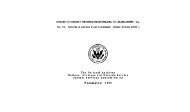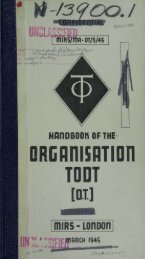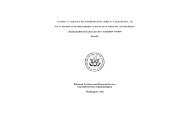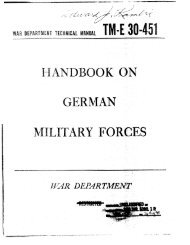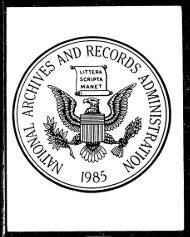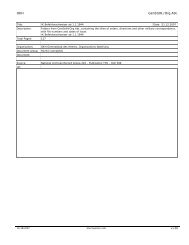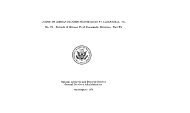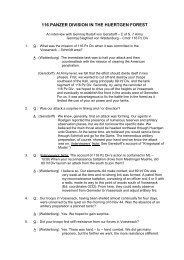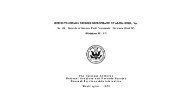- Page 3: JJ id K uex
- Page 8 and 9: WAR DEPARTMENT, Document No. 95. Of
- Page 13 and 14: AUTHORITIES. An asterisk (*) denote
- Page 15: AUTHORITIES. IX Fonts mil italics e
- Page 18 and 19: XII SERVICE AND OTHER ABBREVIATIONS
- Page 20 and 21: ABBREVIATIONS USED ON THE FRENCH GE
- Page 23 and 24: abaissement, m. , sinking, depressi
- Page 25 and 26: accore accore, a., (top.) steep, pe
- Page 27 and 28: adjoint adjoint au chef de corps, f
- Page 29 and 30: afffit agremeiits affut d fllche, b
- Page 31 and 32: air 9 alezan air 67.5, (man.) air i
- Page 33 and 34: allumeur 11 ambulance allumeur fusa
- Page 35 and 36: amorce 13 angle II. Beginning, indi
- Page 37 and 38: anglet 15 anonymc anglct, m., inden
- Page 39 and 40: appareil 17 application appareil de
- Page 41 and 42: araser 19 argon araser, v. a., to m
- Page 43 and 44: arme 21 arinc arme & magasin, magaz
- Page 45 and 46: arret 23 arroser arrt, aux s, (mil.
- Page 47 and 48: aspirer 25 asscrment aspirer, v. a.
- Page 49 and 50: attachement 27 atterrir attachement
- Page 51 and 52: auto-rSparateur 29 avail t-fosse au
- Page 53 and 54: avis 31 avis de transport, (Fr. a.,
- Page 55 and 56: alancicr 33 ban balancler decoupoir
- Page 57 and 58: araquc 35 barreau baraque, f., (mil
- Page 59 and 60: astion 37 bailment bastion casemate
- Page 61 and 62:
atterie 39 batterie batterie de gue
- Page 63 and 64:
attre 41 berme battre la priere. to
- Page 65 and 66:
illet blelme billet de sortie, (mil
- Page 67 and 68:
foois 45 lioite bois en grume, timb
- Page 69 and 70:
ordereau 47 bouchon bordereau d'env
- Page 71 and 72:
ouloii 49 boussole boulon d'embarra
- Page 73 and 74:
ancard 51 bravoure brancard mobile,
- Page 75 and 76:
igade 53 brocher brigade de ligne,
- Page 77 and 78:
ficher 55 buttoir buclier, v. a., t
- Page 79 and 80:
cadence 57 cahicr cadence, perdre l
- Page 81 and 82:
caler 59 camp caler, v. a., to choc
- Page 83 and 84:
cancvas 61 canon canevas de detail
- Page 85 and 86:
capitaine 63 carabine capitaine au
- Page 87 and 88:
carrc 65 cartouche carr, position d
- Page 89 and 90:
castration 67 cGiiicntcr castration
- Page 91 and 92:
certificat 69 chaine certificat de
- Page 93 and 94:
champ 71 chantiev champ, aux s (mil
- Page 95 and 96:
chardoii 73 charger chardon, m., (m
- Page 97 and 98:
chasse 75 c ha iidiere chasse h bis
- Page 99 and 100:
chef 77 chemise diet d'escadrons, (
- Page 101 and 102:
clieval 79 clieval cheval & deux ma
- Page 103 and 104:
cheval 81 chevalier cheval, plier u
- Page 105 and 106:
chieii cincclle chien vert, (mil. s
- Page 107 and 108:
civifcre 85 elef civiereft projecti
- Page 109 and 110:
code 87 colback code de justice mil
- Page 111 and 112:
colonne 89 combat colonne(s) accoup
- Page 113 and 114:
commandant 91 commissaire commandan
- Page 115 and 116:
commission 93 compas commission spe
- Page 117 and 118:
compte 95 conducteuv comptc en deni
- Page 119 and 120:
congS 97 console congg & titre de s
- Page 121 and 122:
contre-b liter 99 contre-platine eo
- Page 123 and 124:
contrdleur 101 cordage contrOleur,
- Page 125 and 126:
eornichon 103 corps eornichon, m.,
- Page 127 and 128:
cOtoyer 105 coulisse cfltoyer, v. a
- Page 129 and 130:
coup 107 coupe II. Fencing and rela
- Page 131 and 132:
courfoe 109 courroie courbe de defi
- Page 133 and 134:
coussinet 111 crachat coussinet de
- Page 135 and 136:
creosoter 113 crochet creosoter, v.
- Page 137 and 138:
crosse 115 cuirass crosse, f., (sm.
- Page 139 and 140:
curseur 117 damasquinage curseur, m
- Page 141 and 142:
dbouchage 119 dechapper debouchage,
- Page 143 and 144:
detommis 121 dfccommis, a., (cord.)
- Page 145 and 146:
defourncr 123 djecteur dWoxirner, v
- Page 147 and 148:
demon tir 125 demi-voQte dementir,
- Page 149 and 150:
denture 127 d6pot denture, & flancs
- Page 151 and 152:
desajuste 129 deserter desajustt, a
- Page 153 and 154:
desimir 131 devancer desunir, v. a.
- Page 155 and 156:
directeur 133 discipline direeteur,
- Page 157 and 158:
distance 135 document distance, f.,
- Page 159 and 160:
donblemon t 137 dressage doublement
- Page 161 and 162:
dynamite 139 eau dynamited cellulos
- Page 163 and 164:
ecart 141 Gchauguette (cart moycn,
- Page 165 and 166:
gclatement 143 ccolc gclatement, ge
- Page 167 and 168:
couvilloii 145 effet Gcouvillon-ref
- Page 169 and 170:
eiectrieite 147 embarrasser eiectri
- Page 171 and 172:
embrouill 149 emplol embrouiM, p. p
- Page 173 and 174:
enclanchement 151 enfant enclanchem
- Page 175 and 176:
engrenage 153 enroulcur engrenage d
- Page 177 and 178:
entree 155 ciivers entree, f., entr
- Page 179 and 180:
SpSc, rengatner V , v. remettre I'
- Page 181 and 182:
gquipage 159 erse Cquipage d'armce,
- Page 183 and 184:
cspace 161 essoufflement cspace, ch
- Page 185 and 186:
etaloii 163 ttat etalon autorise, (
- Page 187 and 188:
eteimlre 165 etre Cteindre lesfeux,
- Page 189 and 190:
vent 167 execution event, deboucher
- Page 191 and 192:
exploiter 169 extraterritoriality e
- Page 193 and 194:
faire 171 farcineux faire dormant,
- Page 195 and 196:
faux-fret 173 fer faux-fre"*, m., v
- Page 197 and 198:
fer 175 former fer Poret, a shoe wi
- Page 199 and 200:
ferrure 177 feu lerrure periplantai
- Page 201 and 202:
feuille 179 m feuille mattresse , l
- Page 203 and 204:
filet 181 flummc filet scctionne, s
- Page 205 and 206:
flour 183 fo in; n re fleur, f., fl
- Page 207 and 208:
fontaine 185 force fontaine, f., sp
- Page 209 and 210:
formation 187 fort formation, f., f
- Page 211 and 212:
foudre 189 four foudre de guerre, h
- Page 213 and 214:
fourneaii 191 fourrure foiirneau &
- Page 215 and 216:
franchissement 193 frein franchisse
- Page 217 and 218:
front 195 fuseau front de combat, (
- Page 219 and 220:
fusil 197 gSchcr fusil choice-bored
- Page 221 and 222:
galct 199 gamelle galet a friction,
- Page 223 and 224:
garde 201 gare garde se mettre en ,
- Page 225 and 226:
gaz 203 genie gaz de combustion, ga
- Page 227 and 228:
gigots 205 godet gigots, m., pi., (
- Page 229 and 230:
gotitte 207 grand goutte, f., drop;
- Page 231 and 232:
grenade 209 grivier grenade eclaira
- Page 233 and 234:
guerluchone 211 guide guerluchone,
- Page 235 and 236:
hachc 213 hansard hachc & main, han
- Page 237 and 238:
hausse du demi-tour de manivelle, (
- Page 239 and 240:
hernie 217 homme hernie, f., hernia
- Page 241 and 242:
houille brunc, lignite; charbon de
- Page 243 and 244:
imperialc 221 incompetence Imperial
- Page 245 and 246:
indicatcur 223 iniirmcF Sndicatetir
- Page 247 and 248:
innavigable 225 Instable innavigabl
- Page 249 and 250:
in tendance 227 Intel-version iu te
- Page 251 and 252:
j a cli i' re 229 Jarre.tc Jachere,
- Page 253 and 254:
joie 231 Jouail Joie, f., joy. Join
- Page 255 and 256:
journe 233 justesse Journfce, homme
- Page 257 and 258:
lache 235 lame lache, p. p., (mach,
- Page 259 and 260:
lancement 237 largeur lancement de
- Page 261 and 262:
Iciiticulaire 239 lever lenticulair
- Page 263 and 264:
Icvier 241 Hbertc levier suptrieur,
- Page 265 and 266:
lignc 243 lignc nvestissement, (sie
- Page 267 and 268:
ligne 245 limonite ligne de reswcct
- Page 269 and 270:
liteau 247 logemend liteau, m., str
- Page 271 and 272:
lotissement 249 lunette lotissement
- Page 273 and 274:
machine 251 machine machine a cylin
- Page 275 and 276:
machine 253 machine ft retolter. mo
- Page 277 and 278:
magnC'tisme 255 main magiietisme, m
- Page 279 and 280:
maftre 257 malaclc maitre cable, be
- Page 281 and 282:
mandant 259 manipulateur mandant, m
- Page 283 and 284:
maiiometre 261 marche manomfctrc, t
- Page 285 and 286:
marche 263 marechal marchf, au comp
- Page 287 and 288:
maritime 265 martcau maritime, a.,
- Page 289 and 290:
masse 267 matelot masse des ecoles,
- Page 291 and 292:
mecaiiismc 269 mglangeoir mfecanism
- Page 293 and 294:
mer 271 mesurer en- , at sea; mer (
- Page 295 and 296:
mettre 273 meule mettre a bord, to
- Page 297 and 298:
mine 275 mise mine, poudre poudre d
- Page 299 and 300:
mixto 277 molestation tnixte, a., m
- Page 301 and 302:
monte-charge(s) 279 moral monte-cha
- Page 303 and 304:
mortier 281 motiflette mortier de t
- Page 305 and 306:
mour 283 mouvcment mour, m., (met.)
- Page 307 and 308:
miir 285 mutation niur en ailes, wi
- Page 309 and 310:
narine 287 navire narine, f., nostr
- Page 311 and 312:
nez 289 niveau nez d'avant, beak (o
- Page 313 and 314:
'nceud 291 iion-disponible nceud de
- Page 315 and 316:
nu 293 oblique nu, monter un cheval
- Page 317 and 318:
us 295 ceil bus enfonte dure. chill
- Page 319 and 320:
officier 297 ogive offlcler en bour
- Page 321 and 322:
1 en gnrdonnancer 299 ordre cMonnan
- Page 323 and 324:
ortie 301 outre-passer ortie, prati
- Page 325 and 326:
ouvrage 303 pactiser ouvreau, m., (
- Page 327 and 328:
palan 305 palmc palan, passer en fr
- Page 329 and 330:
pansage 307 paquet pansage, jeu d'c
- Page 331 and 332:
pare 309 parfumer pare divisionnair
- Page 333 and 334:
partie 311 pas partie morte, (fort.
- Page 335 and 336:
passer 313 patente passer, v. a. n.
- Page 337 and 338:
pair-.; 315 pays pause de pas, (mil
- Page 339 and 340:
peloton 317 i pc lie peloton hors r
- Page 341 and 342:
perdre 319 personnel perdre, v. a.
- Page 343 and 344:
phare 321 ptece pharc, gardien de ,
- Page 345 and 346:
piece 323 pierre piece(s) reguliere
- Page 347 and 348:
pilastre 325 plnasse pilastre rampa
- Page 349 and 350:
piquet 327 piston piquet, de , (mil
- Page 351 and 352:
place 329 plan place, petite , (for
- Page 353 and 354:
planchette 331 plaque planchette gr
- Page 355 and 356:
plateau 333 platre plateau collecte
- Page 357 and 358:
plomb 335 poigne plomb de mer, grap
- Page 359 and 360:
point 337 pointe point d'appui, sup
- Page 361 and 362:
p61e 339 pompe pOle maqnetique, mag
- Page 363 and 364:
pont 341 pont pont d'assaut, assaul
- Page 365 and 366:
port 343 porte-appareil port & bane
- Page 367 and 368:
portc-fraisc 345 porter porte-frais
- Page 369 and 370:
poser 347 poste poser, v. a. n., to
- Page 371 and 372:
poteau 349 poudre poteau de jonctio
- Page 373 and 374:
poulie 351 poursulvre poulie double
- Page 375 and 376:
poutrelle 353 prendre poutrclle, h
- Page 377 and 378:
president 355 pri-venir president,
- Page 379 and 380:
prise 357 profll prise au vent, (of
- Page 381 and 382:
prolonge 359 provoquer prolonge, f.
- Page 383 and 384:
puits 361 quantity pults de service
- Page 385 and 386:
quatre 363 queue quatre, par la gau
- Page 387 and 388:
abattre 365 ra final rabattre un de
- Page 389 and 390:
agr6er 367 ralentissement ragrfier
- Page 391 and 392:
anee 369 ranger ranee, f., skid, pa
- Page 393 and 394:
apurc 371 ratelier rftimre, f., ras
- Page 395 and 396:
ayon 373 rebattre rayon d' explosio
- Page 397 and 398:
ecevoir 375 reconnaissance recevoir
- Page 399 and 400:
ectification 377 redrcssage rectifi
- Page 401 and 402:
dformc 379 rcgagnage rtforme, of/ic
- Page 403 and 404:
I'economie, (of the government) to
- Page 405 and 406:
ein 383 relcvcr rein, poursuivre I'
- Page 407 and 408:
emiser 385 remplissage remlser, v.
- Page 409 and 410:
enfaftage 387 rentrer renfaltage, m
- Page 411 and 412:
epassage 389 rcpllcr repassasc, m.,
- Page 413 and 414:
eprise 391 regulation reprise, en ,
- Page 415 and 416:
essort 393 rttahlir ressort plat, (
- Page 417 and 418:
etour 395 retraiichement retour de
- Page 419 and 420:
evetement 397 rhumb revetement, dcm
- Page 421 and 422:
ive 399 roblnet rive ennemie, (mil.
- Page 423 and 424:
omaine 401 roiuielle romaliie d lem
- Page 425 and 426:
oue 403 roue roue de carrier e, qua
- Page 427 and 428:
oulage 405 route roulage, par le ,
- Page 429 and 430:
mine 407 sableux ruine, f., fall or
- Page 431 and 432:
sac 409 sain tc- barbe sac, cul de
- Page 433 and 434:
salut 411 sape salut, ^changer des
- Page 435 and 436:
saut 413 sch abraq ue saut avec arm
- Page 437 and 438:
scorie 415 secret scorie douce, sla
- Page 439 and 440:
section 417 semainc section (s) tec
- Page 441 and 442:
sen ti nolle 419 serpcntln sentinel
- Page 443 and 444:
serrure 421 service serrure encaste
- Page 445 and 446:
service 423 siege service de sante,
- Page 447 and 448:
signature 425 signature, f., signat
- Page 449 and 450:
soleil 427 sonde soleil levant, sun
- Page 451 and 452:
soudable 429 soulagr soud able, a.,
- Page 453 and 454:
soupape 431 sous-lieutenant soupape
- Page 455 and 456:
spectre 433 station spectre, sfdlai
- Page 457 and 458:
subsistance 435 support subsistance
- Page 459 and 460:
surete, soupape de , safety valve;
- Page 461 and 462:
table 439 tache table d'appardl, wo
- Page 463 and 464:
talon 441 tamiser talon, donner du
- Page 465 and 466:
taranche 443 teigne taranche, f., l
- Page 467 and 468:
temperature 445 tenir temperature d
- Page 469 and 470:
teiiue 447 terrassement temie, . gr
- Page 471 and 472:
tesson 449 tete tesson, m., potsher
- Page 473 and 474:
tlgc 451 tige, (arbres &) basses ke
- Page 475 and 476:
tir 453 tir tir reel, fire under se
- Page 477 and 478:
tirer 455 tiroir tirer & brasfrancs
- Page 479 and 480:
torchis 457 idle tOle lamince rolle
- Page 481 and 482:
tortiller 459 tortiller, v. a., to
- Page 483 and 484:
tourilloii 461 iournjssc tourillon
- Page 485 and 486:
train 463 trait train sanitaire per
- Page 487 and 488:
tranche 465 transport tranche^, ref
- Page 489 and 490:
travail 467 traverse of work; resis
- Page 491 and 492:
trepaner 469 tricycle trtpaner, v.
- Page 493 and 494:
trot 471 troupe trot assis, close t
- Page 495 and 496:
tube 473 turco tube a poudre, (art.
- Page 497 and 498:
tuyfcre 475 usage tuyere plongeante
- Page 499 and 500:
val 477 vapcup val, d de. down from
- Page 501 and 502:
vflo 479 venteux ve"lo, m., (famili
- Page 503 and 504:
vernier 481 vcrtlgc vernier, m., ve
- Page 505 and 506:
fif 483 virure Wlf, allure ve, (man
- Page 507 and 508:
vis 485 visitc vis, filet de , scre
- Page 509 and 510:
oie 487 voile I. Railroads; II. Mis
- Page 511 and 512:
voix 489 volte voix, & portec dc ,
- Page 513 and 514:
voyager 491 wurst voyager, v. a., t
- Page 515:
APPENDIX. THE FRENCH REVOLUTIONARY
- Page 518 and 519:
Copyright, 1917, By C. DE W. WILLCO
- Page 521:
PREFACE. Of the words contained in
- Page 524 and 525:
Mcin mfidecin. M. W minenwerfer (Ge
- Page 526 and 527:
Abat Abattoir Slaughterhouse. Abb A
- Page 528 and 529:
FRENCH WEIGHTS AND MEASURES. I. LEN
- Page 531 and 532:
abut, m., slaughtering (of cattle);
- Page 533 and 534:
allumage 511 annonciateiur allumage
- Page 535 and 536:
armee 513 armee, f., army; fleet (u
- Page 537 and 538:
avion 515 ballon avion de commandem
- Page 539 and 540:
aton 517 bleu baton, m., stick; fer
- Page 541 and 542:
oucher 519 brigadier bouclier, m.,
- Page 543 and 544:
caglbi 521 cantochc cagibi, m., (mi
- Page 545 and 546:
cartouche 523 chambre cartouche de
- Page 547 and 548:
chassis 525 chou chassis, m., frame
- Page 549 and 550:
clouterie 527 commis clouterie, f.,
- Page 551 and 552:
eoiiducteur 529 coqullle coiiducteu
- Page 553 and 554:
coureur 531 crocodile coureur 5 dou
- Page 555 and 556:
debattre 533 dtfiler dbattre, v. t.
- Page 557 and 558:
derive 535 direction dCrive, f., (a
- Page 559 and 560:
droit 537 Scroll droit penal, (tow)
- Page 561 and 562:
encoche 539 escadrille encoche, f.,
- Page 563 and 564:
exa imiii 541 feu examen, m., exami
- Page 565 and 566:
force 543 friturer force lifting po
- Page 567 and 568:
gare 545 grade gare (d')origine d'e
- Page 569 and 570:
habillage 547 imperiale habillage,
- Page 571 and 572:
joint-age 549 lava jointage, m., jo
- Page 573 and 574:
ligne 551 maison ligne reservee (mi
- Page 575 and 576:
marquer 553 mettre marquer, v. t.,
- Page 577 and 578:
10ten r 555 non-percussion jnoteur
- Page 579 and 580:
oi'flcier 557 panncau officier de r
- Page 581 and 582:
peage 559 pigeon m., toll; dniis de
- Page 583 and 584:
plan 561 poids plan de derivation,
- Page 585 and 586:
Dorte-cartcs 563 poste porte-cartes
- Page 587 and 588:
projectile 565 radeau projectile po
- Page 589 and 590:
ebroussement 567 rggulateur rebrous
- Page 591 and 592:
^seau 569 robinet Cseau, commission
- Page 593 and 594:
sape 571 serie sape ft deux formes,
- Page 595 and 596:
sous-groupement 573 tablcr sous-gro
- Page 597 and 598:
Tesla 575 tir Tesla, proper name; p
- Page 599 and 600:
' traetioii Ot i traction kippomobi
- Page 601 and 602:
tuyauterie 579 viaiidc tuyauterle,
- Page 603 and 604:
voftiiFe 581 ziiic voittirc porte-b
- Page 611:
CO PAUL R. CARR. LTD. Oriental and



